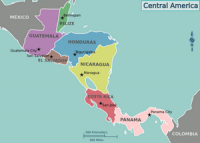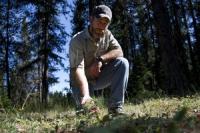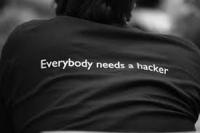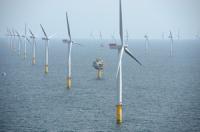-
Lucrative human smuggling business via Central America benefits many

A new report estimates that the smuggling of unlawful migrants from the Northern Triangle region of Central America—Guatemala, Honduras, and El Salvador—to the United States generated between $200 million and $2.3 billion for human smugglers in 2017.
-
-
The darker side of the dark web: Weapons trade

Debates over gun regulations make headlines across the world, but there’s an underground operation for weapons that has drawn very little attention – until now. Researchers crept into the dark web to investigate how firearms are anonymously bought and sold around the world.
-
-
Environmental “secondary perils” an increasing threat: Swiss Re

The catastrophe loss experience of the last two years is a wake-up call for the insurance industry, highlighting a trend of growing devastation wreaked by so-called ‘secondary perils’ – which are independent small to mid-sized events, or secondary effects of a primary disaster.
-
-
There’s a massive cybersecurity job gap – we should fill it by employing hackers

Cybersecurity incidents are gaining an increasingly high profile. These attacks are becoming increasingly sophisticated, using psychological manipulation as well as technology. To face these challenges, society needs cybersecurity professionals who can protect systems and mitigate damage. There is already an active population with a strong passion for cybersecurity – hackers.
-
-
China catching up to the U.S. in innovation
If China is only a copier, not an innovator, then the competitive threat it poses to advanced economies would be limited. But there is no reason to believe China won’t follow the path of “Asian tigers” that rapidly evolved from copiers to innovators, which poses a serious threat.
-
-
Securing blockchain technology for cryptocurrency and other applications
Cryptocurrency, or digital currency, was introduced in 2009 by Bitcoin, and the market has since expanded to include many other brands such as Ethereum, Ripple, Litecoin and Zcash. Because it is based on unique blockchain technology, a decentralized network that doesn’t require a third party to process transactions, cryptocurrency operates independently from the global banking system. The privacy that users of a network based on blockchain technology have, however, is a major drawback.
-
-
Nixon and Reagan tried closing the border to pressure Mexico – here’s what happened
Just a week ago, President Donald Trump appeared poised to take the drastic step of closing the U.S.-Mexico border to both trade and travel. But on 4 April, the president backpedaled and instead gave Mexico a year to stop the flow of drugs across the border. If that didn’t happen, he threatened, auto tariffs would be imposed – and the president suggested he might still close the border if that didn’t work. If Trump ever follows through on his threat and puts up a closed sign at the southern border, it wouldn’t be the first time. Twice in the last half-century the U.S. has tried to use the border to force Mexico to bend to America’s will. The ruse failed both times.
-
-
U.S. industries turn to feds for help in economic race with China
In the U.S. economic battle with China, the Chinese government is often portrayed as a kingmaker, making large investments in research and paving the way for Chinese companies to thrive. China, it turns out, is a good foil for U.S. industries as they ask the U.S. government to do more to help them compete globally.
-
-
Nagging security concerns over using Huawei’s tech in Europe
New report urges NATO members to look to emulate Britain, which created an entire government office to scrutinize Huawei’s products for security problems.
-
-
Supporting global companies against cyber threats
A consortium of U.K. cyber security experts is to support global businesses to tackle online threats and protect themselves from cybercrime. The Cyber Readiness for Boards project has been launched to explore the factors shaping U.K. board decisions around cyber risk and develop interventions to provide guidance and support.
-
-
Bigger than Huawei: U.S. broadens scrutiny of Chinese technology
A flurry of seemingly disconnected actions by the U.S. government to curb the involvement of Chinese technology firms in the U.S. economy over the past year reflects the Trump administration’s intensifying concern that those firms could — now or in the future — abet espionage by Beijing’s intelligence services.
-
-
British oversight body: Security flaws in Huawei 5G networks
A British oversight board has slammed the Chinese telecom giant Huawei for software security flaws. The report, however, stopped short of blaming Chinese intelligence agencies for the engineering defects. The United States is concerned that Huawei is a front for the Chinese intelligence services, and that rolling out Huawei’s 5G system in Europe would open the door for Chinese spying or sabotage.
-
-
Israel’s Carbyne, RapidSOS partner to improve 911 calls
Dialing 911 in an emergency is something that we’ve all been instructed to do since childhood. And old-fashioned, simple dialing is what most of us are still doing, even in an age of far more sophisticated technology. Next-gen public safety tech company will provide call takers with more informative real-time data to help first responders locate and treat callers.
-
-
Dunford: Google’s work with China “challenges” U.S. military advantage

The top U.S. military officer has called out U.S. technology giant Google for its artificial intelligence venture in China, saying it “creates a challenge” in maintaining a U.S. military advantage over the Chinese.
-
-
Offshore wind energy potential not exploited by U.S. energy companies

When it comes to wind energy, the United States is sitting on a gold mine, so to speak. It’s a moment of untapped potential that, if harnessed properly, could transform the way the U.S. uses energy, one expert says.
-
More headlines
The long view
If Trump Wants More Deportations, He’ll Need to Target the Construction Industry
As President Donald Trump sends mixed messages about immigration enforcement, ordering new raids on farms and hotels just days after saying he wouldn’t target those industries, he has hardly mentioned the industry that employs the most immigrant laborers: construction. Almost a quarter of all immigrants without a college degree work in construction.
Federal R&D Funding Boosts Productivity for the Whole Economy − Making Big Cuts to Such Government Spending Unwise
Large cuts to government-funded research and development can endanger American innovation – and the vital productivity gains it supports. If the government were to abandon its long-standing practice of investing in R&D, it would significantly slow the pace of U.S. innovation and economic growth.
Smaller Nuclear Reactors Spark Renewed Interest in a Once-Shunned Energy Source
In the past two years, half the states have taken action to promote nuclear power, from creating nuclear task forces to integrating nuclear into long-term energy plans.
